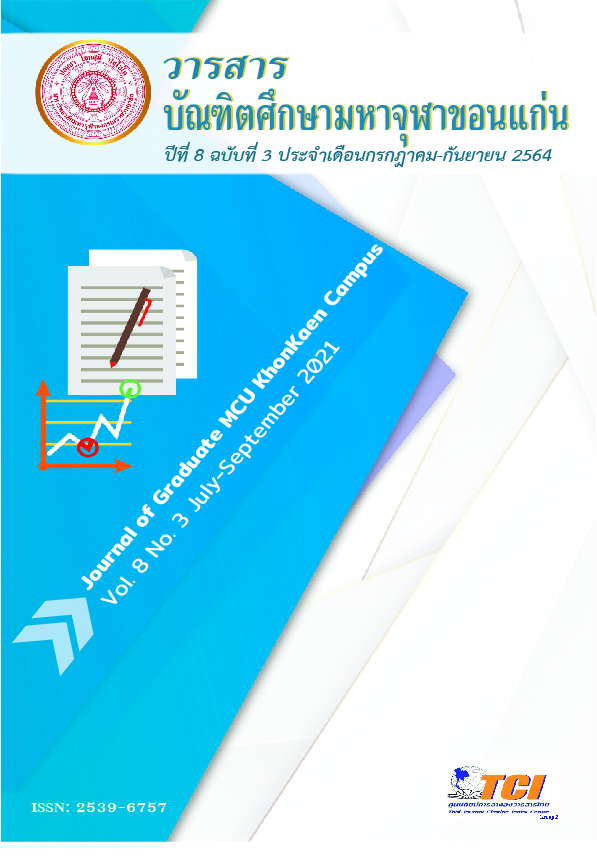แนวทางการพัฒนาศักยภาพนักเรียนนายสิบตำรวจตามหลักไตรสิกขาของศูนย์ฝึกอบรมตำรวจภูธรภาค 4
Main Article Content
บทคัดย่อ
งานวิจัยนี้มีวัตถุประสงค์ คือ 1) เพื่อศึกษาหลักไตรสิกขาในคัมภีร์พระพุทธศาสนาเถรวาท
2) เพื่อศึกษาสภาพศักยภาพของนักเรียนนายสิบตำรวจของศูนย์ฝึกอบรมตำรวจภูธรภาค 4 และ 3) เพื่อเสนอแนวทางการพัฒนาศักยภาพนักเรียนนายสิบตำรวจตามหลักไตรสิกขาของศูนย์ฝึกอบรมตำรวจ ภูธรภาค 4 ซึ่งเป็นการวิจัยเชิงคุณภาพ
ผลการวิจัย พบว่า
หลักไตรสิกขาในคัมภีร์พระพุทธศาสนาเถรวาท: หลักไตรสิกขาเป็นคำสอนเกี่ยวกับการพัฒนามนุษย์สู่จุดหมายของชีวิต 2 ระดับ คือ 1) ระดับโลกียะ เป็นการดำเนินชีวิตให้บรรลุประโยชน์ ในปัจจุบันและเบื้องหน้า เช่น มีสุขภาพดี พึ่งตนเองได้ เป็นต้น 2) ระดับโลกุตตระ เป็นจุดหมายสูงสุด คือ การมีปัญญารู้ถึงธรรมชาติของโลกและชีวิต อันทำให้จิตเป็นอิสระ
สภาพศักยภาพของนักเรียนนายสิบตำรวจของศูนย์ฝึกอบรมตำรวจภูธรภาค 4 : ศูนย์ฝึกอบรมตำรวจภูธรภาค 4 ได้จัดการศึกษาอบรมหลักสูตรนักเรียนนายสิบตำรวจ และนำโครงการพัฒนาศักยภาพนักเรียนนายสิบตำรวจตามหลักไตรสิกขา มีกระบวนการศึกษาอบรมความรู้พื้นฐานทางด้านร่างกาย จิตใจ ปัญญา และสังคม ทำให้เป็นตำรวจชั้นประทวนที่มีศักยภาพเป็นผู้มีความรู้ความสามารถและคุณธรรมจริยธรรม สูงขึ้น
แนวทางการพัฒนาศักยภาพนักเรียนนายสิบตำรวจตามหลักไตรสิกขา ของศูนย์ฝึกอบรมตำรวจภูธรภาค 4 ได้แก่ 1) ด้านศีล : ผู้บังคับบัญชา ครูฝึกและครูผู้สอน มีความรู้ความเข้าใจเรื่องศีลและนำศีล
มาพัฒนาตนเอง เป็นกัลยาณมิตรฝึกให้นักเรียนนายสิบตำรวจให้เป็นตำรวจที่ดี มีความประพฤติสุจริต
ทั้งกายวาจา สุขภาพแข็งแรง 2) ด้านสมาธิ : ผู้บังคับบัญชา ครูฝึกและครูผู้สอนมีความรู้ความเข้าใจ
เรื่องสมาธิและนำสมาธิมาพัฒนาตนเอง จัดการฝึกอบรมทางจิตใจ อารมณ์ นักเรียนนายสิบตำรวจให้มีความสุข 3) ด้านปัญญา: ผู้บังคับบัญชา ครูฝึกและครูผู้สอนมีความรู้ความเข้าใจเรื่องปัญญาและนำปัญญามาพัฒนาตนเอง จัดการศึกษาอบรมให้นักเรียนนายสิบตำรวจเป็นตำรวจที่เก่ง มีความรู้ความเข้าใจ
ในการใช้ปัญญาแก้ไขปัญหาและรู้วิธีที่จะปฏิบัติหน้าที่และการดำเนินชีวิตได้
Article Details
เอกสารอ้างอิง
กองบัญชาการศึกษา. (2560). หลักสูตรนักเรียนนายสิบตำรวจ. กรุงเทพมหานคร: โรงพิมพ์ตำรวจ.
ชูชัย สมิทธิไกร. (2558). การฝึกอบรมบุคลากรในองค์การ. กรุงเทพมหานคร: สำนักพิมพ์แห่งจุฬาลงกรณ์มหาวิทยาลัย.
พุทธทาสภิกขุ. (2547). การศึกษาสมบูรณ์แบบ : คือวงกลมที่คุ้มครองโลกถึงที่สุด.กรุงเทพมหานคร: อุษาการพิมพ์.
พระพรหมคุณาภรณ์(ประยุทธ ปยุตฺโต).(2551). วิธีคิด ตามหลักพุทธธรรม. (พิมพ์ครั้งที่ 9). กรุงเทพมหานคร: สำนักพิมพ์ศยาม.
พีรวัส อินทวี. (2560). แนวทางพัฒนาการบริหารสถานศึกษาตามหลักไตรสิกขาของโรงเรียนวิถีพุทธสำนักงานเขตพื้นที่การศึกษาประถมศึกษาสุรินทร์ เขต 1 และ เขต 3. ใน ดุษฎีนิพนธ์พุทธศาสตรดุษฎีบัณฑิต. มหาวิทยาลัยมหาจุฬาลงกรณราชวิทยาลัย.
มหาจุฬาลงกรณราชวิทยาลัย. (2560). พระไตรปิฎกภาษาไทย ฉบับมหาจุฬาลงกรณราชวิทยาลัย. กรุงเทพมหานคร: โรงพิมพ์มหาจุฬาลงกรณราชวิทยาลัย.
ศูนย์ฝึกอบรมตำรวจภูธรภาค 4. (2563). แผนปฏิบัติราชการศูนย์ฝึกอบรมตำรวจภูธรภาค 4 ประจำปีงบประมาณพ.ศ. 2563. ขอนแก่น : ศูนย์ฝึกอบรมตำรวจภูธรภาค 4.
สุทธิพร รัตนธร ศรัทธา. (2562). รูปแบบรูปแบบการบูรณาการหลักไตรสิกขาในกิจกรรมของชมรมพุทธศาสตร์กรมสรรพากร. ใน ดุษฎีนิพนธ์พุทธศาสตรดุษฎีบัณฑิต. มหาวิทยาลัยมหาจุฬาลงกรณราชวิทยาลัย.
สุปรียา ธีรสิรานนท์. (2555). การศึกษาวิเคราะห์พัฒนาการการเรียนรู้ในกรอบของไตรสิกขากับทฤษฎีการเรียนรู้ของสกินเนอร์. ใน ดุษฎีนิพนธ์พุทธศาสตรดุษฎีบัณฑิต. มหาวิทยาลัยมหาจุฬาลงกรณราชวิทยาลัย.
สำนักงานตำรวจแห่งชาติ. (2563). แผนปฏิบัติราชการสำนักงานตำรวจแห่งชาติ ประจำปีงบประมาณ พ.ศ. 2563. กรุงเทพมหานคร: โรงพิมพ์ตำรวจ.
อรทัย มีแสง. (2555). ทฤษฎีบูรณาการเชิงพุทธ. ในดุษฎีนิพนธ์พุทธศาสตรดุษฎีบัณฑิต. มหาวิทยาลัยมหาจุฬาลงกรณราชวิทยาลัย.

